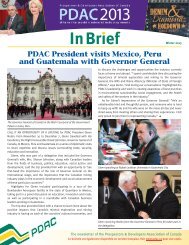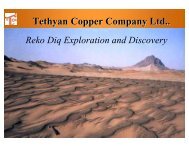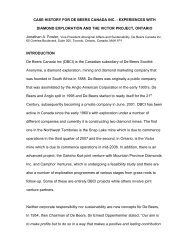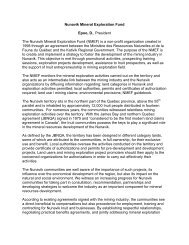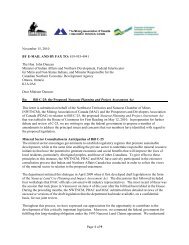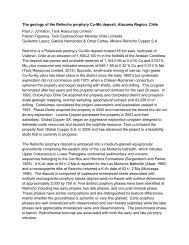Ron Gagel - Prospectors and Developers Association of Canada
Ron Gagel - Prospectors and Developers Association of Canada
Ron Gagel - Prospectors and Developers Association of Canada
- No tags were found...
You also want an ePaper? Increase the reach of your titles
YUMPU automatically turns print PDFs into web optimized ePapers that Google loves.
<strong>Ron</strong> <strong>Gagel</strong>tackles theintricacies<strong>of</strong> miningunder theIFRSphoto by Michelle siuAccounting firms may possess the expertiserequired to interpret the International FinancialReporting St<strong>and</strong>ards (IFRS) adopted by Canadianpublic companies in 2011, but it’s people like<strong>Ron</strong> <strong>Gagel</strong> who have the real life experience todeal with the unusual accounting issues facingthe mining industry—especially the junior sectorthat is so prolific in <strong>Canada</strong>.That’s why the PDAC chose <strong>Gagel</strong>, a charteredaccountant who has worked in the industry formore than a quarter <strong>of</strong> a century <strong>and</strong> been aPDAC board member since 1997, to assist themore than 1,000 juniors that make up the bulk <strong>of</strong>the PDAC membership as they transition to theIFRS accounting st<strong>and</strong>ards that took effect onJanuary 1, 2011. The st<strong>and</strong>ards, which wereinitially implemented in Europe to harmonizeaccounting practises across the European Union,are designed to make company accountsunderst<strong>and</strong>able <strong>and</strong> comparable across internationalboundaries.<strong>Gagel</strong> chairs a mining task force establishedby the PDAC <strong>and</strong> the Canadian Institute <strong>of</strong>Chartered Accountants (CICA) to respond tomining specific issues where the IFRS provideslittle guidance around such topics as how toaccount for flow-through, a financing vehicleunique to <strong>Canada</strong>. The task force does notpublish pronouncements—only the InternationalAccounting St<strong>and</strong>ards board can do that—but does produce “Viewpoints” that juniorslacking accounting depth can use to determinehow to proceed when they hit a snag underthe new rules.“Being the only chartered accountant on theboard <strong>of</strong> the PDAC at the time, it was felt that Iwas the person who was most technically qualifiedfrom a financial perspective,” says <strong>Gagel</strong>, theformer CFO <strong>of</strong> FNX Mining, which merged withQuadra Mining in 2010. “I’ve been with juniorsthat have gone from nothing to producing, soI’ve seen almost everything that’s involved froman accounting perspective when it comes to thejunior side <strong>of</strong> the business.”36 <strong>Prospectors</strong> & <strong>Developers</strong> <strong>Association</strong> <strong>of</strong> <strong>Canada</strong>
ifrs“ The IFRSs do not contemplate the nuances <strong>of</strong> the extractiveindustries. Even mining <strong>and</strong> oil <strong>and</strong> gas, thoughboth are extractive industries, are very different.”— <strong>Ron</strong> <strong>Gagel</strong>Another added bonus is that throughout theinitial set-up <strong>of</strong> the task force, <strong>and</strong> until herecently joined TMAC Resources as theirExecutive Vice President <strong>and</strong> CFO, <strong>Gagel</strong> wasnot affiliated with one mining company oraccounting firm, although he did sit on theboards <strong>of</strong> Adriana Resources, DalradianResources <strong>and</strong> Stonegate Agricom.The rest <strong>of</strong> the task force is made up <strong>of</strong> representativesfrom the largest Canadian public accountingfirms, including KPMG, Deloitte & Touche,PricewaterhouseCoopers, Ernst & Young, RaymondChabot Grant Thornton <strong>and</strong> BDO <strong>Canada</strong>.Given several years to prepare before theJanuary 2011 conversion date, the majority <strong>of</strong><strong>Canada</strong>’s public mining companies have madethe switch to IFRS, a set <strong>of</strong> accounting principlesused in most countries, the United States beingthe most significant exception. But that doesn’tmean that all the wrinkles have been ironed out.“Mining has a lot <strong>of</strong> unique issues associatedwith it. For example, going underground <strong>and</strong>digging shafts <strong>and</strong> tunnels makes for an unusualbusiness,” says <strong>Gagel</strong>. “The IFRSs do not contemplatethe nuances <strong>of</strong> the extractive industries.Even mining <strong>and</strong> oil <strong>and</strong> gas, though both areextractive industries, are very different.”As a result, the PDAC-CICA mining task forcehas developed nine “Viewpoints” on variousissues that range from how to define the beginning<strong>of</strong> commercial production, to determiningfunctional currency, to guidance on farm outarrangements for exploration properties. Andthey are working on more.“This is a value-added service to the PDACmembership,” says <strong>Gagel</strong>. “The PDAC is trying todo something for its members by providing theguidance they <strong>and</strong> their auditors need to accountfor certain unusual aspects <strong>of</strong> mining accounting.”Some issues have been contentious, whileothers, such as mining royalties, have beenshelved because they are “too complex <strong>and</strong>varied,” says <strong>Gagel</strong>. The IFRS is already investigatingthe principles for royalties from a broader,multi-industry perspective.But although adopting IFRSs has not beenwithout its challenges, <strong>Gagel</strong> says the newaccounting system gives Canadian companiesglobally comparable metrics that should helpthem attract capital.“Capital flows to where it has the best return,” says<strong>Gagel</strong>. “But if you have country-specific accounting,there is an element <strong>of</strong> risk <strong>and</strong> confusion thatreduces the efficiency <strong>of</strong> the capital markets.”The mining task force is important to thetransition process because <strong>of</strong> the lack <strong>of</strong> guidancefrom the IFRS about an industry that most <strong>of</strong>the financial world sees as a “rounding error insize” <strong>and</strong> not the economic powerhouse that itrepresents in <strong>Canada</strong>.Even though, after all is said <strong>and</strong> done, a juniormining company’s balance sheet may look the sameunder IFRS (where it is referred to as a “Statement<strong>of</strong> Financial Position”) as it did under <strong>Canada</strong>’sGenerally Accepted Accounting Principles (GAAP),there is a great deal <strong>of</strong> training <strong>and</strong> documentationrequired for companies to make the switch.At least GAAP <strong>and</strong> IFRS are both principlesbased,which means that they both begin withst<strong>and</strong>ards that can be interpreted accordingto the situation. This is different from the morerules-based type <strong>of</strong> system that the United Statesclings to, which resembles a Napoleonic code.“Principles-based accounting permits someflexibility in interpreting rules, so the IFRSs arewritten at a high level <strong>and</strong> don’t necessarilyget into minutia, especially industry-specificminutia,” says <strong>Gagel</strong>. “We’re always askingwhich principle are we talking about, <strong>and</strong> that’swhere you get interpretations <strong>of</strong> accounting.”<strong>Gagel</strong> says IFRS issues continue to arise in themining sector, such as how to account for goldlinkedfinancing, resource depletion <strong>and</strong> thereopening <strong>of</strong> a previously closed mine.“There are still a lot <strong>of</strong> issues out there thatneed to be addressed. Accounting is contin uouslyevolving so I don’t see an end to the mining industryIFRS task force in the foreseeable future.”— By Virginia HeffernanAnnual Report 201237




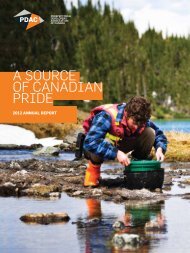
![Fredy Marino.ppt [Read-Only]](https://img.yumpu.com/46988510/1/190x146/fredy-marinoppt-read-only.jpg?quality=85)
